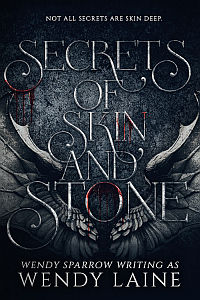There’s much I could say about the importance of diverse stories and characters in fiction. However, while depictions of all types of characters are valuable for expanding choices for readers, the stories that should be most encouraged are those from authors who can provide an authentic perspective.
That means it’s especially important to raise up the voices of those with first-hand experience, known as “own voices.” The point of “own voices” is to listen to those who know.
Although I write diverse characters because that’s how they come to me, as a non-own-voices author, I don’t appeal to diversity shout-outs with my marketing. After all, I’m not writing these characters to be trendy, so I don’t want to take a slot on a “diversity list” of books from an author with a more authentic perspective.
In fact, I’d rather those lists be populated by those with own-voices stories. Along those same lines, rather than rambling about a topic I believe is important, I’ll leave the very capable Wendy Sparrow to share her own-voices insights into the subject. *smile*
I first met Wendy on Twitter about 6 or 7 years ago, and she’s one of my favorite people—and one of my favorite authors. (Seriously, she’s one of the few authors on my auto-buy list, especially as her latest is a gargoyle story like mine. *grin*) She’s preparing for a release under her pen name Wendy Laine that’s very close to her heart—and her experience.
Today she’s here to to talk about what own voices means and how we all can write the best diverse-but-not-own-voices stories possible. As she points out, when it comes to writing about mental illness (or other traits leading to marginalization), it’s possible to do real harm if we get it wrong, so we should all work together to get things right.
Please welcome Wendy Sparrow! *smile*
*****
Mental Illness and “Own Voices”
by Wendy Sparrow (writing as Wendy Laine)
My upcoming YA debut was written in 2010. I’d written many manuscripts before, and I’ve got quite a lot written after that, but Secrets of Skin and Stone needed seven years and the right scenario to be published. Sometimes authors will find themselves thinking, “I’m so glad this didn’t get published when I first queried it,” and this was definitely one of those times.
Writing a novel about a character with obsessive-compulsive disorder, who also practices cutting, was something I approached with a determination that I might call zealous. I needed the book that Teen Me needed, and since it hadn’t been written, I got started.
It’s Hard to Get Diversity Right—Even with Own Voices
Mental illness is a difficult portrayal to get right, and that is coming from someone who has had OCD her whole life. At the time I wrote this novel, I was still keeping quiet about both my OCD and my past as a cutter. I knew others like me, but not a lot.
In the intervening years, I’ve become an expert in what it’s like to be me. In June of 2013, I decided to come out on my blog about the dark thoughts associated with OCD.
Doing this forced me to examine myself, to do research, and opened the door for contact with others struggling with OCD. My hands shook for days after I posted that first time, though—and I had a resurgence in all things associated with my OCD.
Since then, I’ve added to the posts on my blog about OCD, PTSD, depression, and self-harm. You’d think it’d get easier to post, but I still scrutinize each post at least a dozen times before taking a deep breath and hitting publish.
Even Own-Voices Authors Need Feedback
In Secrets of Skin and Stone, Piper has the same type of OCD that I do, Pure-O, and, like I am, she’s a cutter. No one understands how triggering self-harm can be like someone who once cut, in my opinion, so the cutting scenes in the book were difficult to write. I wanted them accurate, but not gratuitous.
I ran them by many, many beta “sensitivity” readers. In fact, I ran those scenes by so many people that I can’t remember them all.
You can’t even imagine how many times I’ve read this novel—I’m the epitome of OCD stereotypes when it comes to editing. A conservative estimate of two dozen times reading this, and I still feel uncomfortable reading the cutting scenes.
I mentioned I was glad that it’d taken this long to get it published. There is no way I could have done this story right even two years ago.
I hadn’t examined my condition to the degree I have now. I’ve written nearly three dozen posts on the topic of mental illness, the majority about OCD. I’ve spoken with, mentored, and befriended many people through my blog posts. I know what it means to be me now.
Additionally, there’s a very delicate balance between accuracy and sensationalizing when portraying mental illness in fiction. I didn’t have the skill to navigate that in 2010. Finally, I needed the editor I worked with on this novel, someone familiar with diverse reads and how to handle the depictions of them. I’m almost ashamed of how clumsy I was in dealing with some aspects of the condition I have even in what I’d considered final drafts.
Diverse Stories Are Needed from Everyone
It might seem like I’m suggesting no one should handle characters with mental illness unless they have the condition themselves. I’ll admit that it probably makes it more accurate. Not to mention that if you do come under fire for your portrayal, you have the ability to make your case for how it was depicted. On the other hand, I would have been very, very grateful as a teen for books with characters with accurate, non-stereotypical OCD.
We do need more diverse reads and not just angsty, poignant books, but also novels normalizing diversity like mental illness and disability. Our world is made up of flawed individuals—no one is perfect or a rubber-stamped copy of any aspect of humanity. It’s time that fiction represented more.
Mentally ill people go on adventures. People with disabilities live large and vividly. We are more than the checkboxes on government documents.
How Can Non-Own-Voices Authors “Get It Right”?
- Rely on Research—not Stereotypes
If you choose to write a character with a diverse experience, research the heck out of it—which includes seeking as many first person accounts as you can. Don’t rely on stereotypes.
I went undiagnosed until well into my twenties because my OCD looks nothing like how it’s portrayed by Hollywood. If your OCD character doesn’t have any dark thoughts but likes to clean a lot—you’re doing it wrong. It’s a shallow depiction that is an insult to those you’re trying to represent.
- Find Sensitivity Readers to Double-Check
Whenever possible, find sensitivity readers and editors to double-check you. I’ve done sensitivity reads on autism, Asperger’s, and OCD…and every last one of them was inaccurate in some way and many were offensive.
Don’t throw out the excuse of “well, it might look like this with someone somewhere.” Chances are that ultra specific outlier will not be reading your book, and the fires you’ll roast in on social media will leave scars. Get it right.
- Question Your Intentions
Check yourself on whether you’re doing this for the right reason. Diversity is not a fad or the “in thing.” There’s a vast spectrum of humanity so side characters should represent that, but being a token “mentally ill” person is not cool.
- Too Much Work? Don’t Write the Story
Also, if you’re not up for the research and emotional investment of getting it right…stay out of our sandbox. Think of the medical motto of “first, do no harm.” Inaccurate depictions or sensationalizing mental illness can harm readers.
- Don’t Erase the Diverse Traits to Force a Happy Ending
Finally, if you have a character with a disability or mental illness, do not magically cure them or suggest that a cure is the only way for them to be happy. If I was cured of my OCD tomorrow, I wouldn’t be me. It’s in there deep. And I have found ways to be deliriously happy, even with my OCD at its worst.
Magical cures suggest that we need to be fixed in order to be happy, deserve love, or be equal to others. Honor the struggles and achievements of those dealing with mental illness and disability by making sure your voice is true.
Writing a book that is preceded by a trigger warning is not for everyone, and I don’t know that I feel equal to the task even now. I tried. And I think Teen Me would be grateful for the attempt.
*****
 Wendy Laine is the penname of author Wendy Sparrow. Writing is in Wendy’s blood as are equal parts of Mountain Dew and chocolate. Wendy has been telling tales since she was a child with varying amounts of success. Her parents clearly anticipated her forays into the paranormal because she heard “The Boy Who Cried Wolf” over and over.
Wendy Laine is the penname of author Wendy Sparrow. Writing is in Wendy’s blood as are equal parts of Mountain Dew and chocolate. Wendy has been telling tales since she was a child with varying amounts of success. Her parents clearly anticipated her forays into the paranormal because she heard “The Boy Who Cried Wolf” over and over.
She lives in Washington State with a wonderful husband and two quirky kids and is active in autism and OCD support networks. She can usually be found on Twitter where she’ll talk to anyone who talks to her and occasionally just to herself.
Website | Blog | Twitter | Facebook | Goodreads | Newsletter
*****
About Secrets of Skin and Stone:
 Something is wrong in Hidden Creek. The sleepy Alabama town is more haunted than any place fiend hunter Grisham Caso has ever seen. Unearthed graves, curse bags, and spilled blood all point to an evil that could destroy his gargoyle birthright. The town isn’t safe for anyone, and everyone says fiery Piper Devon knows why.
Something is wrong in Hidden Creek. The sleepy Alabama town is more haunted than any place fiend hunter Grisham Caso has ever seen. Unearthed graves, curse bags, and spilled blood all point to an evil that could destroy his gargoyle birthright. The town isn’t safe for anyone, and everyone says fiery Piper Devon knows why.
Piper wants to leave Hidden Creek behind. She’s had enough of secrets—they hide in the shadows of her room and tell her terrible things are coming. Too-charming city boy Grisham might be her only chance to save herself.
To survive, Piper and Grisham have to shed their secrets and depend only on each other. But what lurks in Hidden Creek still might take everything away from them, including each other.
Amazon | iTunes | Kobo | Barnes & Noble | Goodreads | Entangled
*****
Bonus Giveaway from Wendy!
*****
Thank you, Wendy! I’m so glad we all get to learn from your insights. I agree completely with all of your tips here—so much so, that I can’t think of anything else I’d add. *grin*
Have you heard of the “own voices” concept before? Do you agree that it’s important to encourage and raise up the voices of those with an authentic perspective? Do you think non-own-voices authors should be willing to put in the work to prevent harm? Do you have any other suggestions based on your experience? Do you have any questions for Wendy?

